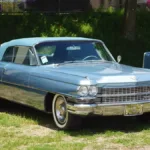Chances are you have, at some point, once, felt the steering wheel shaking while making high-speed movements. That is not just annoying but sometimes nerve-racking, too. But what’s the cause of this, and much more, how can you solve it? In the following article, we will dive into some of the common reasons for a shaking steering wheel, especially during high-speed driving, and then present to you the best methods for solving this problem.
Introduction
Driving must be smooth and in control. However, if your steering wheel is shaking – mainly at higher speed – it’s pretty irksome to the focus and can make an otherwise enjoyable ride irritating. That being said, worse still is that shaking might indicate some serious issues requiring rectification. Even if not always serious, ignoring this could lead to more critical – and price costlier problems.
Follow me through this all-inclusive guide, and I’ll lead you to find what’s causing the problem-from tire issues to something a little more serious, like your suspension.
Common Causes of Steering Wheel Shake
When your steering wheel starts to shake at high speeds, there could be several reasons behind it. Let’s break down the most common causes:
Wheel Balancing Issues
One of the more usual causes your steering wheel will shake when you travel at high speeds is a condition known as wheel imbalance. Due to regular operations, your wheels will become worn and imbalanced with time. It usually occurs if the weight distribution on the tire is not balanced. The faster you go, the greater the shaking effect, which brings about that nuisance shaking from your steering wheel.
Uneven Tire Wear
Tires will eventually run out. However, the wear on tires is not typically equal. This can cause your steering wheel to shake, particularly if you are turning. Uneven surfaces happen when your tires wear down on one side of the car more than the other. Sometimes this can be from bad tire rotation, and sometimes it can be because the suspension is bad.
Misaligned Wheels
The position of the wheel in relation to your vehicle is what one can refer to as wheel alignment. When all the wheels are not aligned properly, you are likely to experience steering problems, which includes that shaking that most people associate with high speeds. This may be very easy to occur when one hits a pothole, curbs, or just by wearing over time. If the wheels in your car are out of alignment, then it will bother the way that your car rides as if you are riding in a seesaw; it transfers that vibration in the steering wheel.
Brake Problems
If the complaint has arisen regarding the shake of the steering wheel when it’s ridden at high speeds and also when braking, chances are you are going to get close as long as you guess that it has something to do with the brake system. It may be due to warped brake rotors. An uneven or warped surface on a rotor causes brake pads to grip unequally and through this vibration, brings the vibration to the steering wheel.
Suspension Issues
Your car’s suspension system can help your vehicle absorb bumps, but there are parts in it that need to be replaced or rehabilitated from time to time, like the shocks or struts. If these are worn out or damaged, the steering wheel may shake in your hands. Bad suspension usually deteriorates with time, so it would be best to have it checked right away.
Faulty Wheel Bearings
Wheel bearings allow your wheels to rotate freely when supporting the weight of your car. When your wheel’s bearings are damaged or have worn out, they can bring down vibrations in your steering wheel. If this problem is not corrected in time, it could begin to compound depending on the momentum in which your car is traveling.
Damaged Axles
The axle connects the wheels to the rest of the car. If the axle is bent or damaged perhaps from hitting a curb or pothole it can lead to steering wheel vibrations. This issue usually worsens the faster you drive.
Diagnosing the Issue

So, your steering wheel is shaking now what? Before you can fix it, you need to figure out what’s causing it. Here are some steps to diagnose the issue:
How to Inspect Tires and Wheels
It begins with a visual inspection of tires. Just glance and look for uneven wear, bulges, and cracks. And check tire pressure also; sometimes low tire pressure causes shaking, and it is probably about the easiest thing you can ever do.
Now take a look at your wheels. Are they in good shape, or do you see any visible damage or wear? If you are still unsure, have a pro check your wheel balance.
Checking for Alignment and Balancing Problems
If your wheels are not balanced or aligned, it will be tough to correct them yourself and may necessitate a visit to a repair shop. They use special machine equipment to balance your wheels and realign them if they’re not properly aligned. Of course, this might cost, but in general, this is much more cost-effective than fixing more expensive components when the time comes.
Fixes for Steering Wheel Vibrations
Once you’ve diagnosed the problem, it’s time to get it fixed. Here are some common solutions:
Wheel Balancing and Alignment
Balancing your wheels is usually the go-to fix if the problem stems from imbalance. Wheel alignment is also essential for keeping your vehicle running smoothly. Both of these services are relatively inexpensive and can be done at most automotive shops.
Replacing Worn Tires
If uneven tire wear is the culprit, you may need to replace your tires. Depending on the severity of the wear, rotating your tires might also help. It’s best to keep an eye on your tires and replace them before they become a serious safety hazard.
Brake Repairs and Maintenance
If your brake rotors are warped, they’ll need to be resurfaced or replaced. This is a more involved repair, but it’s essential to maintain braking performance and prevent further shaking.
Suspension and Axle Inspections
For suspension or axle-related issues, you’ll want to have a professional inspect your vehicle. Replacing shocks, struts, or even a bent axle might be necessary to stop the steering wheel from shaking.
Preventing Future Steering Wheel Shakes

The best way to prevent steering wheel vibrations is to stay on top of regular vehicle maintenance. Here’s what you should do:
Regular Tire Maintenance
Make sure you’re rotating your tires regularly and keeping them properly inflated. This will help prevent uneven wear and keep your ride smooth.
Brake and Suspension Checks
Get your brakes and suspension checked during routine maintenance. Catching issues early can save you from bigger problems later on.
Why It’s Important to Address Steering Vibrations
Ignoring steering wheel vibrations is never a good idea. Not only can it make your driving experience uncomfortable, but it can also be a sign of more severe issues. Left untreated, these problems could lead to expensive repairs or even cause accidents.
Conclusion
A shaking steering wheel is a problem that develops at high speeds and can be traced to quite basic problems such as the imbalance of the wheel or more complex issues of suspension or brakes. Early diagnosis and what subsequent remedies are taken is sure to ensure a much safer ride, and one where you enjoy fewer bumps in the road.
FAQs
1. Why does my steering wheel shake at high speeds?
The most common cause is wheel imbalance, but it could also be due to uneven tire wear, misaligned wheels, brake issues, or suspension problems.
2. Can bad tires cause steering wheel vibration?
Yes, worn or unevenly worn tires can cause your steering wheel to shake, especially at higher speeds.
3. How do I know if my wheels need to be aligned?
If your car pulls to one side while driving or your steering wheel vibrates, it’s a sign that your wheels may be misaligned.
4. Is it safe to drive with a shaking steering wheel?
It’s not advisable. A shaking steering wheel can indicate serious problems that could affect your safety.
5. How much does it cost to fix a shaking steering wheel?
The cost depends on the cause, ranging from a simple tire balance ($15-$50) to more extensive repairs like brake or suspension work, which could cost hundreds.
Also Read : The Ultimate Guide to Portable Winches







